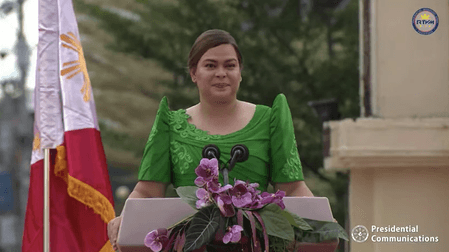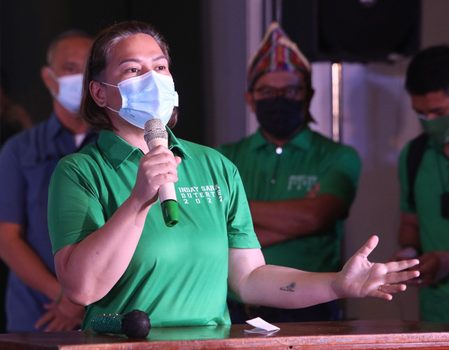SUMMARY
This is AI generated summarization, which may have errors. For context, always refer to the full article.
![[ANALYSIS] Why Sara’s mantra of God, country, and family should not surprise us](https://www.rappler.com/tachyon/2022/06/Why-Sara-mantra-should-not-surprise-us.jpg)
The vice presidential inauguration speech of Sara “Inday” Duterte, delivered in her hometown Davao City June 19, 2022, was not only an attempt to personalize an appeal to segments of the Filipino public. It was rather a reiteration of her overwhelming 32 million votes which, as the vice president-elect put it, was “loud and clear,” empowering her to “serve our motherland.”
When Sara invoked the mantra of God, country, and family as the guiding principle of her professional and political triumph, the younger Duterte may be striving to forge a mediated persona distinct from the authoritarian-strongman spell of her father. The vice president-elect is trying to make her own – yet father-inspired – symbolic version of history, explained Manolo Quezon, by breaking traditions of getting inaugurated ahead of the president-elect and in a different place.
But the tropes of God, country, and family should not be surprising to begin with considering how unrestrained the waves of disinformation are in various channels particularly social media.
As my review of 83 Facebook pages supporting the older Duterte showed, Duterte’s brand of mediated politics represents a highly contradictory type of nationalism that mainstreams infrastructure and security projects while at the same time gradually building on the narrative of God and family to foster a formidable identity.
Exclusionary nationalism on Facebook
Consistent with the rise of authoritarian-populist leaders around the globe, the older Duterte relies on visible symbols of power or what is known as symbolic politics in some Western societies. Unlike other leaders in the West, Duterte heavily refurbishes the Marcosian ploy of using infrastructure programs like Build, Build, Build as legacy projects. Photos of roads and bridges connecting the capital with the rest of the country are cross posted by pages like Duterte’s Presidency “Tapang At Malasakit” (“Courage and Compassion”), as well as claims through posts and comments that the travel time from Southern to Northern Luzon would be reduced from two hours to 30 minutes once Skyway Stage 3 was completed.
Arguing that the Filipino youth are bereft of nationalism and love of country, the older Duterte on many occasions advocated to reinstate the Reserve Officers’ Training Corps that would reinstitute the two-year mandatory military training for senior high school students. Not unexpectedly, this pronouncement is gaining ground with the younger Duterte heading the education department and some senators pushing for a related legislation in the Senate.
A more complicated picture of presumed nationalism is characterized by the themes of God and family.
The theme of God may not be a surprising narrative in a country of over 80 million Catholics. But what pages like Daily Duterte do is to creatively append photos of the leader with biblical verses and messages of prayers to signify faith and devotion through him while also using the same posts to agitate “the other.”
The family narrative on the other hand melodramatically reveres Duterte as the “father of the nation” who tussles with the country’s health and economic crises, one who carries with him the disposition and compassion necessary for caring for the population. On Facebook, the older Duterte is depicted as a family man who has a vision of securing the welfare of the future generation through photos of him carrying and hugging his grandchildren.
The Duterte narrative on Facebook at large defines our disinformation landscape where political leaders use hybrids of factual, misleading, and inaccurate information to advance an exclusionary variant of nationalism necessary for reviving the mythical past and spoiling the democratic consensus of the present.
What is more alarming, as in the case of Duterte Facebook pages, is the meticulously seductive ways in which the blurring of facts and fictions are deployed to tap into the imaginations of the digital public. Going head-to-head with the developing institutional and sociocultural practices aimed at countering disinformation are innovative posts and memes that resonate with real sentiments on the ground. It would help if we start recognizing how complex disinformation is as a well-coordinated production industry and a practice that varies across societies.
Without discrediting the religious and familial messages online, one only has to look at the sources and administrators of these posts (if traceable at all) and the parties that benefit from their messages to make sense of the intention behind the mediated narrative. To be sure, verifying authenticity and factuality online in the Philippines and elsewhere is not as easy as it sounds, especially if we take into account how the news media struggle to compete for news attention with social media channels like YouTube and Titktok where information hardly undergo expert reviews.
![[ANALYSIS] Why Sara’s mantra of God, country, and family should not surprise us](https://img.youtube.com/vi/bjZpKgWoqic/sddefault.jpg)
Although a familiar one, the mantra of God, country, and family is a forceful narrative, and it would be a miscalculation to think that the younger Duterte will not build up her regional and national resources beyond the vice presidential fence.
Put another way, Sara’s brand of politics is not a total break from her father’s, but it would be a mistake to see their style as one and the same. – Rappler.com
Jefferson Lyndon D. Ragragio is an assistant professor at the College of Development Communication, University of the Philippines Los Baños. He has a PhD in media studies from Hong Kong Baptist University. He tweets @JeffRagragio.
Add a comment
How does this make you feel?


There are no comments yet. Add your comment to start the conversation.